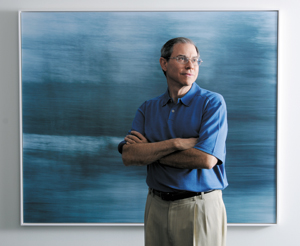Back to the city that works
Economist Dennis Carlton returns to Chicago after two years doing antitrust work at the Justice Department.
By Zak Stambor
Photography by Dan Dry
In June 2007 the Supreme Court overturned a nearly century-old antitrust precedent. The rule, enacted in 1911, made it always illegal—“per se,” in legalese—for manufacturers and distributors to agree on minimum retail prices, stating that doing so would violate the Sherman Antitrust Act. Last year’s decision, Leegin Creative Leather Products v. PSKS Inc., achieved what many University of Chicago economists had advocated for decades: using a case-by-case approach to examine each possible violation’s effect on competition.
As the solicitor general answered the justices’ questions, arguing for overturning the precedent, Graduate School of Business professor Dennis Carlton sat by, pleased with the reasoning he had helped to shape. In the middle of a two-year stint as a deputy assistant attorney general in the U.S. Department of Justice’s Antitrust Division, he had critiqued the mock argument against the law, helping to anticipate questions the justices might ask. Carlton summed up his view in the Summer/Fall 2007 Chicago GSB Magazine: “[R]esale price maintenance can be procompetitive, and therefore it’s inappropriate for the Supreme Court to regard [it] as a per se violation of the antitrust laws.”
 The GSB’s Dennis Carlton found day-to-day government life “enlightening.”
The GSB’s Dennis Carlton found day-to-day government life “enlightening.” Now back at Chicago, he adds, “I’ve written industrial-organization textbooks that deal with these topics.” In fact, Modern Industrial Organization (Addison Wesley, 2004), in its fourth edition, discusses this particular per se rule, which “most economists”—especially those in the Chicago School—“have felt was wrong.” While the Court’s decision appears to be a profound shift in U.S. policy, Carlton argues, “as is often the case, firms will figure out ways to get around rules. So how it plays out in practice is unclear.”
Despite having worked periodically as a consultant for the Justice Department since the early 1990s, Carlton hadn’t been in Washington full time, and he found day-to-day government life “enlightening.” It didn’t take him long to realize “just how difficult it is to change anything.” Nonetheless, he felt he could influence decisions made in the department and especially by his boss, Thomas O. Barnett, assistant attorney general for antitrust.
Carlton, who has taught at the University since 1976 and coedited the Journal of Law and Economics since 1980, spent much of his time examining potential laws’ economic consequences. “I was exposed to several possible ideas as to what the government would put forward,” he says, “and I’d express my own ideas.” For example, he helped develop a way to allocate slots at overcrowded airports, where airlines often schedule more flights than they can realistically handle, leading to delays. “The economic solution is to turn to the market,” he explains, “but that’s not necessarily what the industry wanted.” In his proffered switch, slots would be rationed to reduce congestion, with airlines bidding against each other for the places. “It remains to be seen if it will be put into effect.”
Beyond such projects and his work helping countries relatively new to antitrust law, such as Korea, Japan, Russia, and Mexico, he found it difficult to gauge the department’s pull. “I felt like the captain of an ocean tanker,” he says. “If the captain moves the tanker by an inch or two he can’t tell whether that had any actual effect. It’s only later, when he has a larger view, that he can see whether he had an effect at all.”
A longer-term perspective will provide insight into Carlton’s work with the Antitrust Modernization Commission, a 12-member group appointed by President Bush that examined whether antitrust laws should be modernized. The committee deemed the state of the laws “sound,” yet offered several ways to improve enforcement, such as better state and federal coordination.
Carlton’s legacy, says Barnett, is “ultimately helping [the DOJ] help American consumers and consumers around the world.” He pointed to a group of three- or four-day courses that Carlton led for foreign staffers and Justice Department personnel. The sessions, which staffers attended voluntarily, sought to provide a deeper understanding of the purpose of antitrust laws. “The best way to influence the policy of foreign countries,” says Carlton, “is to educate staffers.” The courses were so successful, Barnett says, that they’ve been made a regular offering.
Back at the University, where his meticulous Charles M. Harper Center office features stacks of perfectly aligned journals, Carlton—in June named the Katherine Dusak Miller professor of economics—continues the research he conducted at the Justice Department. Along with his airport-slot analysis, he’s juggling projects to evaluate electricity mergers and, taking a bigger-picture view, how to quantitatively evaluate U.S. merger policy.
He also plans to use his Justice Department experiences to inform the two MBA microeconomics courses he’s teaching this fall. “The Chicago School has figured out basic economic principles,” he says, “but having been at the Justice Department I might have a different slant on how they should play out.” This spring he’ll teach a course in the PhD sequence on industrial organization—the analysis of firms’ strategic behaviors, market structure, and their interactions—that examines the subject’s intersection with antitrust laws. He enjoys the course because it brings economics and law students together. The former, he says, are inclined to focus on analytical techniques and intricate models, while the latter assert a firm grasp of antitrust laws’ limited ability to alter market behavior.
So, while he found the government work “intellectually stimulating,” Carlton isn’t itching to leave Chicago again. “I doubt I’ll go back [to Washington],” he says. “It was fun going, but once is enough.”
Return to top